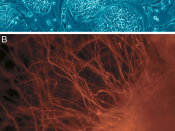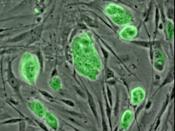Stem cell research, fairly new scientific practice, is a strongly debated topic currently. Affecting this research is the government position, the medical use, and the possible pro and con about this whole biological experience. In the article "A New Look, an Old Battle," Anna Quindlen introduces two main sides to the embryonic stem cell research debate-people who protest the destruction of embryos for stem cell research, and those who believe the potential benefits of this research outweigh the few embryonic deaths. According to Quindlen, stem cell research should be funded for good reasons because it may hold "the key to endless mysteries of human biology, as well as someday help provide the cure for ailments as diverse as diabetes, Parkinson's, spinal cord degeneration, and Alzheimer's." ( Para.3). In the process of stem cell research, the obtaining of stem cells involves the destruction of frozen embryos left over from in-vitro fertilization.
This destruction of embryos is seen a moral problem, especially by those who are supporters of the anti-abortion movement. The battle continues as to whether embryonic stem cell research is morally justifiable. But what it comes down is your opinion. Will it help or will it cause problem? To be able answer this question, one needs to understand thoroughly what the embryonic stem cells are, where they come from, how they are made and what they can accomplish.
Every human being is created from stem cells. In the 2001 article "Embryonic Stem Cells," research at the University of Wisconsin-Madison showed that a stem cell is a blank cell that has the possibility to become any type of body tissue. Three main types of stem cell are adult stem cells, mutipotent stem cell and pluripotent stem cells (embryonic stem cells). While adult stem cells hold real promises as to what we...


